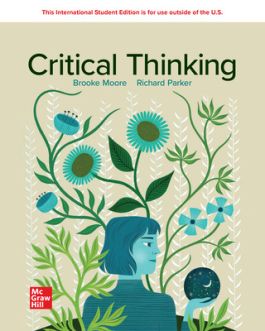Critical Thinking: 2024 Release ISE
2 Reasoning and Arguments?
3 Vagueness, Generality, Ambiguity, and Definition?
4 Believability of Claims and Credibility of Sources
5 Linguistic Persuasion Devices
6 Bogus Logos Part I: Relevance Fallacies
7 Bogus Logos Part II: Induction Fallacies?
8 Bogus Logos III: Formal Fallacies, Fallacies of Ambiguity, and Fallacies Involving Miscalculating Probabilities?
9 Deductive Arguments I (Natural Deduction): Categorical Logic?
10 Deductive Arguments II: Truth-Functional (Sentential) Logic?
11 Inductive Reasoning?
12 Moral, Legal, and Aesthetic Reasoning
The authors’ expanded coverage on how to recognize dubious claims is gravely applicable in the current climate of fake news, deep fakes, and AI-created information. The authors provide guided practice in what instructors say are the most important critical thinking skill sets for students.
McGraw Hill Connect is an award-winning digital teaching and learning solution that empowers students to achieve better outcomes and enables instructors to improve course management efficiency.
High-Quality Course Material
Our trusted solutions are designed to help students actively engage in course content and develop critical higher-level thinking skills while offering you the flexibility to tailor your course to the ways you teach and the ways your students learn.
Assignments & Automatic Grading
Connect features a question bank that you can select from to create homework, practice tests and quizzes. Dramatically reduce the amount of time you spend reviewing homework and grading quizzes, freeing up your valuable time to spend on teaching.
Analytics & Reporting
Monitor progress and improve focus with Connect’s visual and actionable dashboards. Reports are available to empower both instructors and students with real-time performance analytics.
Seamless Integration
Link your Learning Management with Connect for single sign-on and gradebook synchronization, with all-in-one ease for you and your students.




